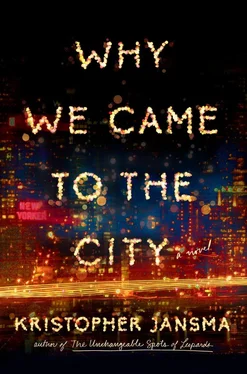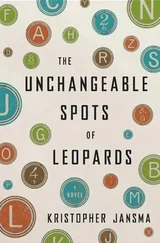“But you do ! There are three hundred sixty-five days in a year and one hundred forty-six menu items, which means that you must eat the same thing at least two and a half times every year.”
“And you never eat the same thing two and half times in a year? You’ve probably had ‘Dargon & Phoenix’ at least twenty or thirty times with me here by now.”
“Yes, but I have also eaten a Guaco-Taco from San Lupe and spanakopita from the Olympic Flame Diner and chicken à la king from Bistro 19! This week alone I’ve had three kinds of frozen yogurt!”
Oliver grinned the way he always did when he was sure he was about to win. “But that’s what you always get at those places.”
“Meaning?” But Jacob could already feel the point sliding away from him.
“Meaning why is it wrong that I order different things from the same restaurant every night, and right that you order the same things from different ones?”
Jacob opened his mouth, but no fire came forth. Why should it be wrong? Wasn’t it more wrong that they had such a glut of dining options that they could eat somewhere different every night of the year, without repeating? That morning on the train Jacob had read an article in the New Yorker about a mountainous area of China roughly the size of France; its slopes were dust, and its citizens were malnourished if they weren’t starving. What sort of God created all men equal but then said fuck it when it came to the corners of the earth? What did the old lady mopping the floor in the back think about him leaving a third of his “Dargon & Phoenix” on his plate?
The look she was giving him was the same sort that the crones in the cafeteria of Moses Maimonides Elementary had once cast his way when he’d eaten only the Hydrox and ignored the rest of his lunch. And how had the rabbis explained it? Because we are the chosen ones, beloved of God , had been the line until about third grade, at which point they began to add Because we were slaves for centuries, and then we wandered in the desert for forty years, and then we lived in unfriendly lands for more centuries. Always strangers, always scapegoats. Killed in Crusades and Holocausts that everyone else has forgotten. For their ancestors being forever fucked over, then, the logic seemed to go, it was okay for the Blaumann family to be better off now. There was often the suggestion that probably it would be only a short while before someone figured out how to take it all away again.
This interpretation had reigned until he’d been bar mitzvahed and begun taking practical accounting and economics, at which point the reasoning became nonsecular: Because you are a participant in a prosperous free economy, in which the work your parents do is valued at a certain amount by the invisible hand of the market, and soon you will take your place in this grand system yourself, and through savings, investments, and avoiding the temptations of credit, you too will deserve privileges and comforts that others do not.
“ Hazan et hakol ,” Jacob muttered.
“A rabbi?” Oliver asked. “Is that what you wanted to be when you were a child?”
Jacob shook his head. He half wanted to tell him — it was just nonsense and stupid superstition. So he’d sworn. So what? Was he going to be struck down there in Szechuan Garden? He opened his mouth to just say it after all this time, but the instant he did, he felt the phone in his pocket buzzing. He took it out and saw Irene’s picture on the screen.
“Hello?” he said, almost before he’d actually answered it.
“It’s Sara” came the voice on the other end, the sound of an ambulance backing up somewhere in the distance. “Irene’s fine. I took her phone because I get no reception in here.”
“Did she go under all right?” Jacob asked softly.
“We should know something in a couple of hours,” Sara said, and Jacob could tell she was at the end of her rope. “But George is losing it over here. He needs to go for a walk, and I have to finish these articles by Friday.”
“You want me to take him to the park or something? Let him play in the dog run?”
Jacob smiled, just long enough that Oliver smiled.
Sara, however, sighed short and sharp. “I don’t care what you do with him, but if he stays here another minute, I’m asking the nurses to sedate him.”
“Tell him to meet me at the Bistro in an hour,” Jacob said, as Oliver called for the check.
They walked back to the flat. Kissed and made up. Oliver insisted he take an umbrella and called him a cab down to the train station.
• • •
From the Hell Gate Bridge, Jacob saw his city, lit up and unreal, as ever. The tip of the Empire State Building was the electric blue of a urinal cake. It was half obscured by the fat clouds above, smoke thick, soot black, but reflecting everything beneath it. Broadway’s streetlights, the Times Square spotlights, the postgraduate apartment $4.99 IKEA track lights, the cigarette embers leaning out the windows of the Frederick Douglass Houses. A trail of white headlights flowing over the Triborough Bridge into town, and the ghostly trail of red brakelights limping back out through the jam.
At Grand Central, Jacob clutched Oliver’s umbrella in front of him like a shield, pushing past the crowds on the stairs and in the station and then on the sidewalks, under a white wash of streetlights, past the pale hordes in Bryant Park and Rockefeller Center. He tried to visualize what must be happening to Irene. He held it in his head like a poem, words and images and process. Awesome, in the old-fashioned sense of the word: inspiring of awe, to the point of humbling. The things they knew now, the things they could do.
Less than fifty blocks away, in a sterile room, Irene was dressed in a loose white gown, laid out like a drowsy queen, the doctors circling around her like humble servants. According to what Sara had relayed to him from Dr. Zarrani, a tube would deliver pure oxygen through a mask, attached by an elastic strap. Clips would be attached to her fingertips and beige cups suctioned to her breastbone to measure the rate of her heart beating, the pressure of her blood. Lower down, a squid of electrode wires would creep across her thorax and out to her wrists, taking pulses back to the electrocardiogram — the EKG — while a pulse oximeter and a capnograph measured the oxygen and carbon dioxide in her blood. The first tumor would be removed via a periorbital excision, during which an invasion of her eyeball itself could — ideally — be ruled out. If not, they’d have to remove the eye itself, but the doctors had said there was essentially zero chance of this happening. Then, while a plastic surgeon began an ophthalmic reconstruction, the surgeons would move to the left arm, where the second tumor could be removed — along with a significant portion of the ulna to ensure that the cancer was fully contained. The extracted bone would be replaced by a graft from the iliac crest, this being the superior border of the “wing of ilium” (Jacob liked the delicate, angelic sound of that) along the superolateral margin of the pelvis.
The truly good news here, according to Sara — who had taken on the role of interpreter between Irene’s doctors and the rest of them — was that the preliminary lymph node biopsy had come back clean, and the doctors believed there was a far superior chance that the postsurgical radiation and the second round of chemotherapy would have a lasting effect on the cancer, now that they were in the — again, less-than-ideal — situation of metastasis. Irene had progressed from stage one to stage two, which meant that the initial lump had sent off phalanxes in search of new territories. It had come down the mountainsides and into the valley of her elbow. But it hadn’t yet gotten to the ports. The lymph nodes, which traversed her whole body, were still unconquered. If only he could write it, somehow. If only they were words on paper, not facts in Irene’s body.
Читать дальше












